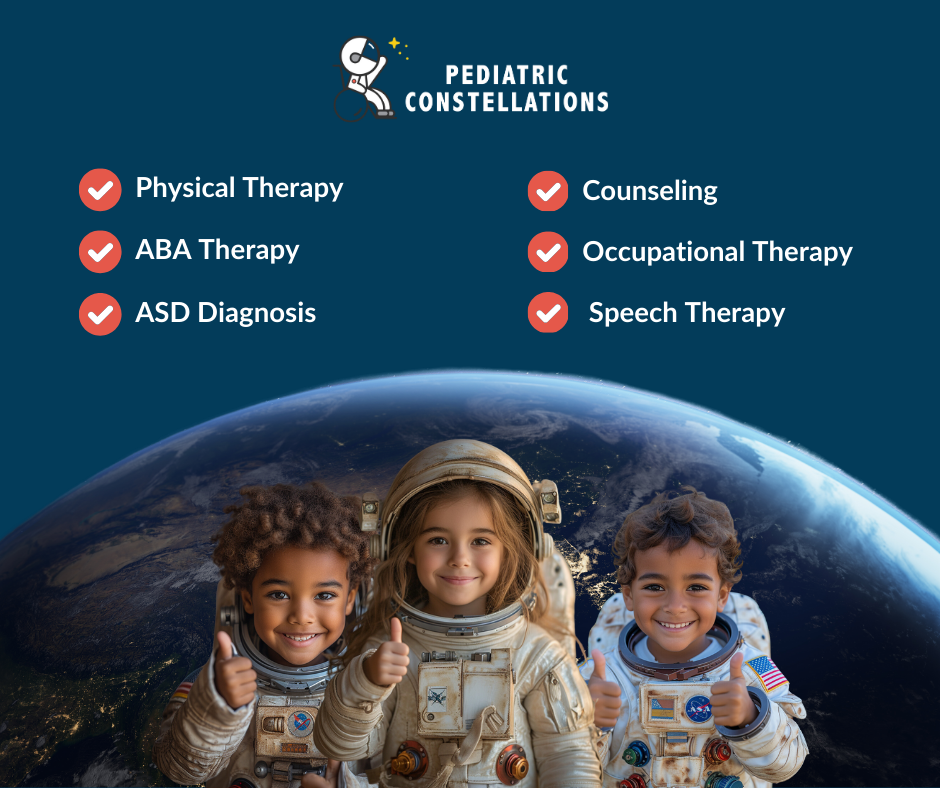
We are proud to share this guest post written by Rosa Benavides and Sergio Rodriguez about Pediatric Constellations, the service they founded to help parents find the village of experts and therapists they need to help their children reach their full potential.
Let’s face it: Ensuring your kids are equipped with everything they need to succeed is overwhelming at times. Every day brings a new challenge, from the tiniest bumps and bruises to the big, heart-stopping worries. Kids are navigating a maze of change and uncertainty, trying to find their way. As parents, you’re their guides, their protectors, and sometimes, even their personal chefs.
You might have heard the saying, ‘It takes a village to raise a child.’ This means that while parents have the final say in what’s best for their children, having a supportive group of caring individuals around is incredibly important. This “village” provides help, love, and diverse perspectives that assist moms and dads in making the best choices for their children.
Unique Kids, Bigger Teams
For those children whose uniqueness shines brightly, their village expands to include a wider array of specialists. This can include:
- Doctors: They play a crucial role in deciphering the physical needs of a child, ensuring they stay healthy and happy.
- Therapists: Experts in uncovering the most effective learning and growth strategies, they tailor their approach to fit the child perfectly.
This expanded network of support not only caters to the varied needs of each child but also highlights the notion that it indeed ‘takes a village,’ especially for those who stand out with their unique needs and talents.
The Biggest Challenge: The “How”
Parents often underestimate their own knowledge. You’re well aware that your child needs to learn essential life skills, like brushing their teeth, showing kindness to peers, and engaging in activities they love. The real puzzle, however, lies in the ‘how.’ How do you effectively teach children who require unique approaches to learning?
In search of answers, many parents turn to the internet, only to find themselves overwhelmed by an avalanche of information. We live in an era overflowing with resources, making it exceedingly difficult to filter through what’s genuinely beneficial for your family. This information overload can leave parents feeling paralyzed, unsure of where to turn next.
So, in this vast sea of advice, who do you reach out to? Family? Friends? Doctors? Therapists? Do you seek guidance from everyone, or do you find yourself retreating from the overwhelming choices, unsure of whom to trust?

Choosing the Right Support
Deciding who to turn to for parenting advice can be tricky. With so many opinions out there, it’s important to know your options. Let’s quickly look at the main sources of support you might consider, without the stress of having to choose just one over the other.
Option 1: Family and Friends
Pros:
- Personalized Support: Offering advice based on a deep personal connection, they provide insights and support that are intimately tailored to your family’s needs and dynamics.
- Accessibility: Often easily reachable, whether through a quick phone call or a short visit, they offer prompt support and guidance in times of need.
- Reliability: Grounded in a longstanding relationship and a genuine concern for your family’s well-being, their advice comes from a place of love and personal investment in your child’s success.
Cons:
- Variability in Expertise: While their advice comes from a place of care, it may not always be backed by the most current knowledge or professional expertise, which can be crucial for specific developmental or health-related issues.
- Personal Perspectives: Their close relationship with your family might lead to advice that reflects their individual experiences and viewpoints, which, although valuable, may not always align with your child’s unique needs or circumstances.
- Familiarity with the Situation: They may rely on general solutions or advice based on common experiences, which might not fully address or appreciate the specific challenges or opportunities your child faces.
Option 2: Healthcare Professionals
Pros:
- Specialized Knowledge: Bringing a depth of expertise in their respective fields, these professionals offer tailored advice and strategies to support your child’s health, development, and educational progress.
- Holistic Strategies: Equipped to offer comprehensive strategies, they look beyond immediate concerns to address the physical, emotional, and cognitive aspects of your child’s development, providing a balanced approach to growth and learning.
- Network of Resources: Access to a broad network allows for referrals and recommendations to specialized services, therapies, and support systems, ensuring that your child benefits from a wide range of expertise and resources.
Cons:
- Scheduling and Access: Obtaining appointments with these professionals can present challenges, including long wait times and the need for referrals, which can delay access to crucial support and guidance.
- Investment: The costs associated with professional services can vary widely and may require careful financial planning, with some therapies or consultations not covered by insurance, leading to significant out-of-pocket expenses.
- Focus of Advice: While their recommendations are rooted in professional expertise and best practices, they may sometimes seem impersonal or overly clinical, potentially overlooking the nuances of your family’s personal preferences, values, and day-to-day realities.
In this journey, you don’t have to pick just one group for advice—mixing what you learn from both family and experts is the best way. This mix helps your child grow in the best way possible, giving them all the love and smart guidance they need.

Create Your All Star Team
We know finding the right doctors and therapists for your child can be hard work. You have to call multiple places, ask many questions about insurance and prices, and it takes a lot of time. That’s why we made Pediatric Constellations. It’s a company created by Rosa Benavidez, a speech therapist, and Sergio Rodriguez, an occupational therapist.
Pediatric Constellations brings together an all-star team of experts who specialize in different areas of child development. Providers like occupational therapists, speech therapists, physical therapists, psychologists and behavioral analysts collaborate closely to provide well-rounded care for kids with diverse abilities and needs.
Working as a unified group of professionals allows your family to develop an individualized plan for your child that addresses their unique challenges across multiple disciplines. Because when a child is struggling, it often impacts many interconnected areas of their life.
Our integrated approach ensures we’re considering your child as a whole, not just treating isolated symptoms.

What Worries You?
Every family’s situation is different, but here are some common challenges our team of professionals can help with:
Occupational Therapy (OT)
Messy handwriting or struggle holding a pencil: OTs can introduce ergonomic tools and exercises to improve grip strength and control.
Difficulties with planning, organization, and routines: Tailored strategies can help children develop effective time management and organizational skills.
Struggles with dressing, eating, grooming, and other self-care tasks: Through practice and adaptive techniques, OTs work to enhance independence in daily living activities.
Sensory processing concerns: Sensory integration techniques can be employed to help children better process and respond to sensory stimuli.
Picky or restricted eating habits: Feeding games and strategies can gradually introduce new foods for a healthier diet.
Goal: Building skills and independence for daily life tasks and activities.
Speech Therapy (ST)
Difficult to understand speech: Techniques to improve articulation and clarity of speech.
Struggles with conversing and pragmatic language: Interactive activities and role-playing can enhance conversational skills and social use of language.
Trouble understanding language or following book stories: Strategies to boost comprehension and narrative skills.
Feeding or swallowing difficulties: Exercises and strategies to strengthen muscles and improve swallowing and feeding techniques.
Goal: Improving communication and connection is key.
Physical Therapy (PT)
Difficulties with skills like running, jumping, throwing: Targeted exercises to develop specific motor skills.
Frequently tripping, bumping into things, or appearing clumsy: Balance and coordination exercises to enhance spatial awareness.
Delays with achieving gross motor milestones: Customized programs to support the development of age-appropriate motor skills.
Struggles to integrate and coordinate skills: Activities that encourage the combination of various motor skills in more complex movements.
Goal: Building strength, coordination, and motor planning.
Applied Behavior Analysis Therapy (ABA)
Challenging behaviors like tantrums or aggression: Individualized strategies to understand and improve responses that help kids make friends.
Rigid routines and refusal to accept unexpected changes: Teaching coping skills to gradually improve flexibility and adaptability.
Social skills or reciprocal interaction difficulties: Social stories, modeling, and practice to improve interaction and communication.
Goal: ABA uses positive reinforcement to teach new behavioral response patterns based on parents’ values and expectations.
Psychology Services
Focus, hyperactivity, or impulse control: Cognitive and behavioral strategies to enhance attention and self-regulation.
Big emotional outbursts or anxieties: Techniques to identify triggers and manage emotional responses.
Perseverating on thoughts, or routines impacting self-esteem: Interventions to broaden interests and build confidence.
Concerns about making friends or social development: Support and strategies to develop effective social skills and build relationships.
Goal: Psychologists provide evaluation, medication management, therapy, and family support, tailored to each child’s unique needs.
The Mind-Heart-Body Connection
As you can see, the areas of OT, ST, PT, ABA and psychology all intertwine when it comes to nurturing kids’ development. Difficulties in one area can create ripples across other areas of life.
That’s why our professionals at Pediatric Constellations see your child as a whole person – not just a diagnosis. The mind, heart and body are all connected:
The Mind: Developing abilities like focused attention, comprehension, memory and problem-solving.
The Heart: Building emotional intelligence, empathy, self-regulation and resilience.
The Body: Strengthening gross and fine motor skills, sensory processing, and speech production.
By taking a comprehensive mind-heart-body approach, we unlock your child’s potential to learn, grow, connect and thrive.

The Right Match is Everything
As parents, you know your child better than anyone. You see their struggles and their strengths. At Pediatric Constellations, we join your journey, bringing expertise to answer your questions and navigate your child’s unique path.
We understand that finding the right match is crucial when it comes to getting your child the care they need. That’s why our innovative app lets you instantly view detailed professionals’ profiles and match with someone who’s the perfect fit based on:
- Their specialty and expertise aligning with your child’s needs
- Availability for appointments on your schedule
- Proximity for convenient office locations near you
- Acceptance of your health insurance plan

A Path to Shine
If you’re feeling overwhelmed and unsure about how to navigate your child’s needs, please remember, you’re not facing this journey alone. The Pediatric Constellations family is here to lighten the load with expertise, resources and care.
We’ll collaborate with you to create a roadmap tailored to your child’s needs. Our comprehensive approach focuses on nurturing the development of your whole child – mind, heart and body. With a dedicated team by your side, we’ll help guide your child toward reaching their full potential.
When it comes to your child’s well-being, the sky’s the limit. We aim to make that potential a reality at Pediatric Constellations. Download our app today and discover available clinicians in less than two minutes!
Charter Moms Chats
Watch Rosa Benavidez and Sergio Rodriguez, owners of Pediatric Constellations, speak with Inga Cotton on Charter Moms Chats on April 23, 2024 at 4:00 PM Central live on Facebook and YouTube.
Rosa Benavidez and Sergio Rodriguez come from Matamoros, Tamaulipas, Mexico, bringing with them a shared dream and years of dedication to children’s health—Rosa as a Speech-Language Pathologist and Sergio as an Occupational Therapist.
Their journey together, from dating for over ten years to saying “I do” in 2021, has been one of love, learning, and a shared passion for making a difference in the lives of children and their families.
Last year, they decided to take a leap of faith and start their own private practice. As they stepped into the world of entrepreneurship, they quickly realized a major challenge that many families face: finding and connecting with the right healthcare providers for their children. That’s why they created Pediatric Constellations.
Their goal is to use technology to make these vital connections easier, ensuring that every child has the support they need to thrive.
Rosa and Sergio know that it takes a village to raise a child, and they’re here to be a part of your village. At Pediatric Constellations, they’re committed to helping families and providers work together seamlessly for the benefit of our children’s futures.
Read More About Support for Functional Needs
- “The Day My Son Learned About His Seven Cognitive Skills and Decided to Pursue Medicine,” Erin Kirwan, San Antonio Charter Moms, May 3, 2023
- “Build Pre-Writing Skills Through Play with Occupational Therapist Jorge Ochoa of TamboRhythms,” Jorge Ochoa, San Antonio Charter Moms, July 5, 2022
- “Vision Therapy Might Be the Solution for Your Child’s Learning Disorder,” Bekah McNeel, San Antonio Charter Moms, July 8, 2020